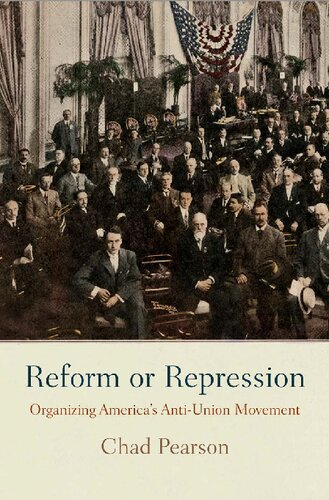

Most ebook files are in PDF format, so you can easily read them using various software such as Foxit Reader or directly on the Google Chrome browser.
Some ebook files are released by publishers in other formats such as .awz, .mobi, .epub, .fb2, etc. You may need to install specific software to read these formats on mobile/PC, such as Calibre.
Please read the tutorial at this link: https://ebookbell.com/faq
We offer FREE conversion to the popular formats you request; however, this may take some time. Therefore, right after payment, please email us, and we will try to provide the service as quickly as possible.
For some exceptional file formats or broken links (if any), please refrain from opening any disputes. Instead, email us first, and we will try to assist within a maximum of 6 hours.
EbookBell Team

4.1
20 reviewsHistorians have characterized the open-shop movement of the early twentieth century as a cynical attempt by business to undercut the labor movement by twisting the American ideals of independence and self-sufficiency to their own ends. The precursors to today's right-to-work movement, advocates of the open shop in the Progressive Era argued that honest workers should have the right to choose whether or not to join a union free from all pressure. At the same time, business owners systematically prevented unionization in their workplaces.
While most scholars portray union opponents as knee-jerk conservatives, Chad Pearson demonstrates that many open-shop proponents identified themselves as progressive reformers and benevolent guardians of America's economic and political institutions. By exploring the ways in which employers and their allies in journalism, law, politics, and religion drew attention to the reformist, rather than repressive, character of the open-shop movement, Pearson's book forces us to consider the origins, character, and limitations of this movement in new ways. Throughout his study, Pearson describes class tensions, noting that open-shop campaigns primarily benefited management and the nation's most economically privileged members at the expense of ordinary people.
Pearson's analysis of archives, trade journals, newspapers, speeches, and other primary sources elucidates the mentalities of his subjects and their times, rediscovering forgotten leaders and offering fresh perspectives on well-known figures such as Theodore Roosevelt, Louis Brandeis, Booker T. Washington and George Creel. Reform or Repression sheds light on businessmen who viewed strong urban-based employers' and citizens' associations, weak unions, and managerial benevolence as the key to their own, as well as the nation's, progress and prosperity.